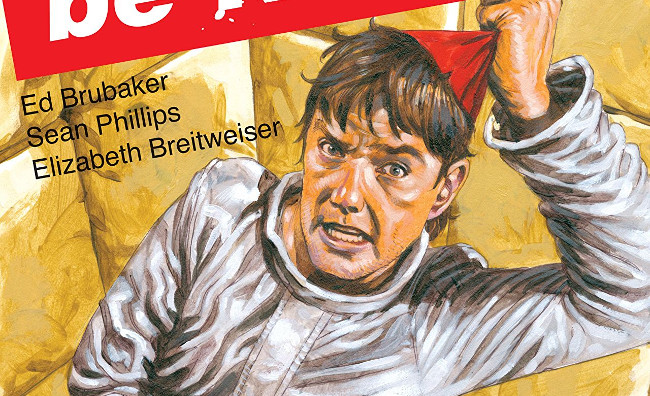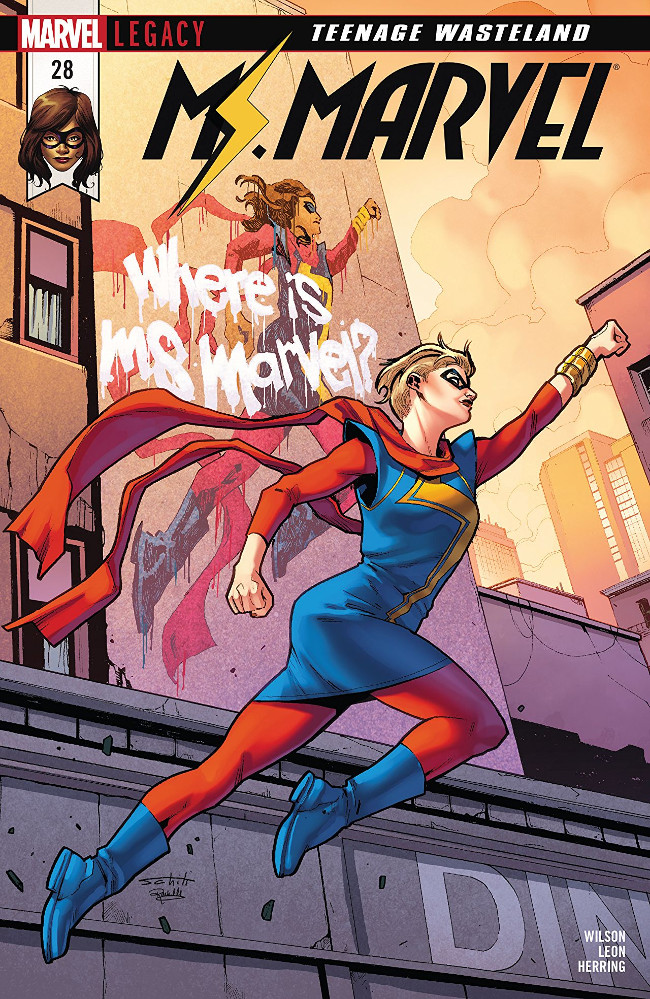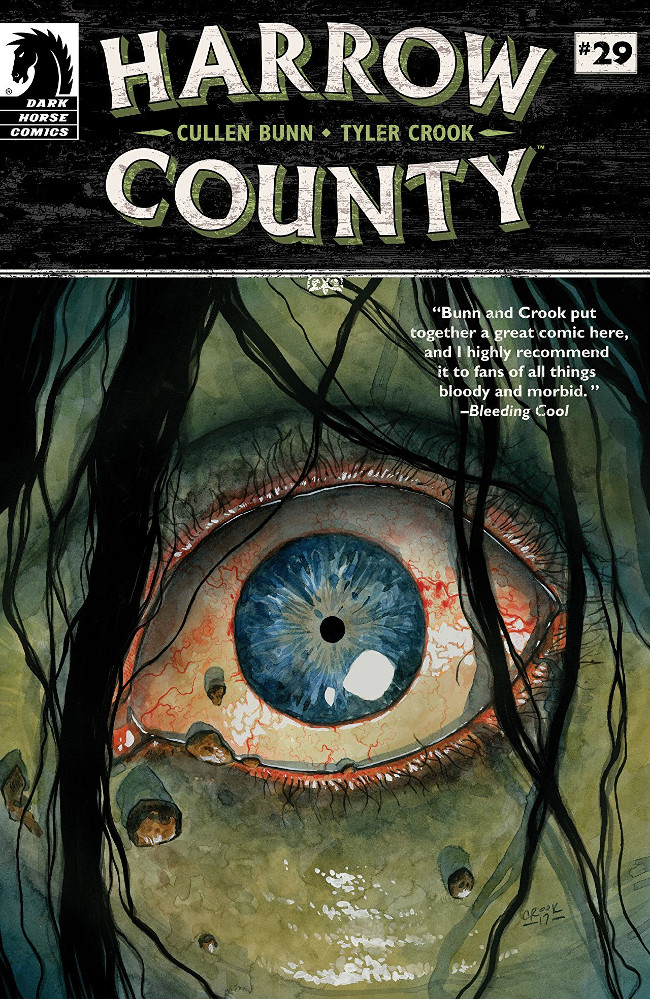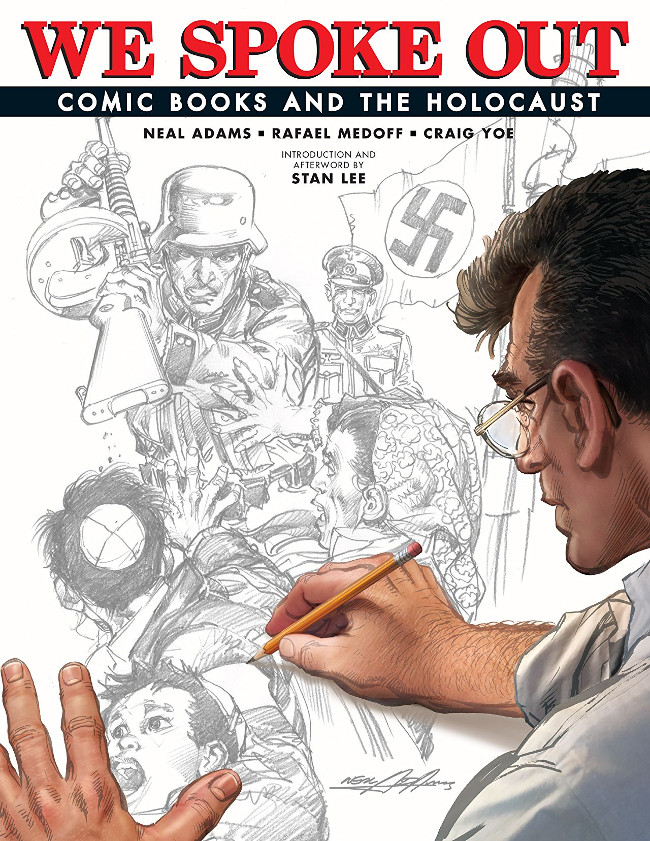
Throughout its run, Kill Or Be Killed, which sees issue #17 on the stands this week from Image Comics, has seen writer Ed Brubaker, artist Sean Phillips and colorist Elizabeth Breitweiser take apart the threadbare cultural myth of the white urban vigilante with a gun. The book has explored all the various ways this trope, at best, comes off as emotionally stunted, and at worst, unhinged. But it’s also struck a careful balance with Dylan, the masked man killing mobsters and Wall Street frauds alike with a shotgun. Dylan isn’t some self-righteous hero determined he and only he was justice. He’s conflicted, scared of himself, and terrified he was losing his mind. Not anymore, however, in what might be the most chilling issue of this series.
Dylan, who’s questioned his sanity for almost the entire series, is trapped in an ironic situation. He’s been committed to a mental institution, and has been entirely honest: He’s the vigilante the police are hunting. But nobody believes this weedy white kid is the masked murderer terrorizing New York streets, especially when a copycat emerges. This issue, though, sets that aside. Dylan may be hallucinating a demon or not, but it no longer matters. He’s convinced he’s the good guy, that nothing he’s doing is wrong, as he carefully plans, and gets away with, a murder of an orderly who he decides deserves it.
This book isn’t a lecture on gun control, but rather a look at a specific mindset, brilliantly captured by Phillips and Breitweiser with careful layout and shading. Dylan has found a worrying form of peace, that he’s OK with killing provided he’s convinced he’s killing the bad guy. That he might be the bad guy himself no longer crosses his mind, and it points to a new, and scary, direction for one of the most thoughtful comics of the last few years.

Ms. Marvel #28, Marvel
As Kamala Khan closes in on her fiftieth issue, G. Willow Wilson and Nico Leon end this arc by getting Kamala out of a self-imposed retirement. Every good superhero has a crisis of self-confidence eventually, especially at Marvel. But what makes Kamala’s arc stand out is both that it’s far more relatable, on a personal level, and the resolution makes a bit more sense. Kamala does what every teen does, disappears into her own mind a little too much, and it doesn’t take a superhero crisis to get her out of it, just a friend with a sympathetic ear. And a pastrami sandwich.
James Bond: The Body #3, Dynamite
Ales Kot and Rapha Lobosco continue this anthology series of sorts, which features vignettes of James Bond’s job and the moral problems Bond has to slice through to get it done. Here, though, it’s not a question of moral greys. Bond’s undercover and swilling whiskey with neo-Nazis, and it’s pretty clear that in part Kot and Lobosco have had enough of the news cycle. But Kot bothers to point out that Nazis are just one expression of racism, even as Bond snuffs out another. It’s unlikely Bond will develop a social conscience, but Kot’s use of him to explore the ugly side of governments has become some of his best work.
Death Of Love #2, Image Comics
Philo Harris takes a pill from a stranger in a bar, and sees Cupids. From this, he becomes convinced the entire metaphysical infrastructure of love is out to get him. Yes, Justin Jordan and Donal Delay are taking rather sharp, pointed jabs at the internet’s various subcultures of men convinced a vast conspiracy is denying them sex, to the point of shouting out “forever alone.” But it’s deeply funny, in part because Philo ties his own noose, here. The book makes it clear that even if Philo is not tripping, his love life is still his own damn fault. But hey, at least he gets to chainsaw some Cupidae!
Cave Carson Has An Interstellar Eye #1, DC Comics
Jonathan Rivera and Michael Avon Oeming fire up a new season of reinventing the obscure DC explorer hero Cave Carson with, seemingly out of nowhere, a surprisingly touching tribute to David Bowie, as an alien rock star summons his old friend Cave to ease him into his rebirth as a literal space oddity. Of course, this being an adventure comic, something goes awry, but Rivera and Oeming offer what’s clearly a heartfelt goodbye, and Oeming delivers some of his trippiest, and yet warmest, art.

Harrow County #29, Dark Horse: Cullen Bunn and Tyler Crook’s brilliant intersection of Faulkner and Lovecraft swings into its final issues with a bang as its heroine faces a threat from the past.
Ninja-K #5, Valiant: Christos Gage and Tomás Giorello ask just how far governments will go to keep their human killing machines free of “baggage” in an issue that sees Ninjak confronting some ugly pasts, his own included.
Weapon H #1, Marvel: Greg Pak and Cory Smith take a goofy idea, a hero who’s a mix of Hulk and Wolverine, and have a lot of fun with it in this story of a hero wandering the Earth and improbably getting involved in weird adventures.
Rumble #4, Image Comics: John Arcudi and Dave Rubin deliver a thoughtful take on why we make the friends we do, especially when one of those friends is a possessed scarecrow.
Lucy Dreaming #1, BOOM! Studios: While writer Max Bemis could stand to dial back the cool-kid dialogue, he and artist Michael Dialynas offer up a fun tribute to daydreams and teenage ennui.
This Week’s Best Collections

We Spoke Out: Comics And The Holocaust, IDW Publishing ($50, Hardcover): Holocaust scholar Rafael Medoff and comics historian Craig Yoe offer up an impressive bit of scholarship exploring how comic books looked at the Holocaust when it was still taboo in much of popular culture, interviewing many of the original artists and writers of the stories in the process, with a little help from Neal Adams.
Guerillas Vol. 4, Oni Press ($20, Softcover): Yes, Brahm Revel’s story of chimpanzee soldiers fighting their would-be captors in the Vietnam era has a terrible pun for a title. But it’s also an interesting metaphor for the questions soldiers face when they lose the illusion they’re fighting a just war.
Spider-Men II, Marvel ($18, Softcover): Brian Michael Bendis and Sara Pichelli’s musing on paths not taken is a surprisingly affecting story between Peter Parker and Miles Morales.
